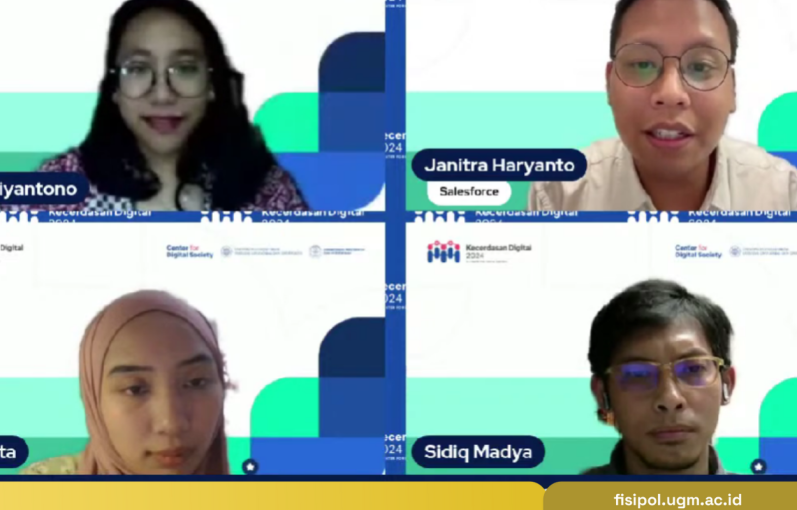
Yogyakarta, 2nd of September 2024–Fisipol’s Center for Digital Society (CfDS) of UGM has organized the opening ceremony for the 2024 Digital Intelligence Course on Monday (2/9) at the official CfDS YouTube Livestream. The Digital Intelligence Course (MKKD) is a course that was initiated by Fisipol’s CfDS collaboration with the Ministry of Communication and Information Technology of the Republic of Indonesia. The course is both open to the public and is free of charge. This year, the Digital Intelligence Course offers two modules, which includes 1) Basic Digital Intelligence, and 2) Advanced Digital Intelligence. This time, the opening ceremony will present the lecturer for the 2024 Digital Intelligence Course Janitra Haryanto and Sidiq Hari Madya, as well as alumni Ratri Arista.
The development of digital technology has impacted and changed the lives of many people, both individually and systematically in the political, social, and economic sector. In a response to those changes, we need to comprehensively understand the changes at hand through various perspectives. Five years since the opening of this course, there have been as many as 24.000 people who have participated in this class.
“This year, there are about 2.700 participants who took the digital intelligence course, and I feel like the numbers are about to get higher,” explained Wawan Mas’udi, the Dean of Fisipol in the opening ceremony. The increasing number of participants in this course is proof that digital transformation can create an inclusive class that can be accessed by just about anyone. The backgrounds of participants in this course are of course diverse, ranging from undergraduates, graduating students, and even fresh graduates.
The Digital Intelligence Course of 2024 offers two modules, which includes both Basic and Advanced Digital Intelligence Course. In the first module, the materials will include the impact and implications of digital transformation. Meanwhile, the second module will bring experienced lecturers and experts in teaching the students about digital research methods.
“The process of digitization in our society is recorded. The presence of digital research methods can help us identify our current situation and create insight, information, and even knowledge,” explained Sidiq Madya, the lecturer from Fisipol UGM Sociology Department. Sidiq continued to explain that in this era of digital transformation, individuals are not merely consumers of content but also the producers of data by using it as a tool to produce insight, information, and knowledge for the public.
The Center for Digital Society of Fisipol UGM is committed to ensure that the various forms of digital transformation can have a positive impact on the welfare of the people. The understanding of digital intelligence is expected to be an instrument to improve welfare, democratization, and social inclusion of the people. This move is another step forward that Fisipol takes towards its commitment to SDG 4 Quality Education.
